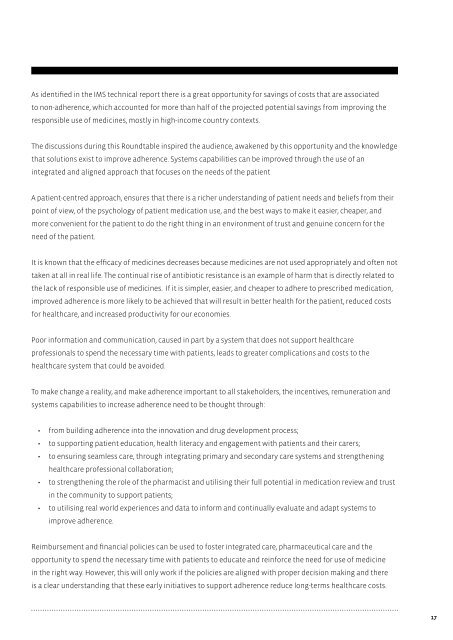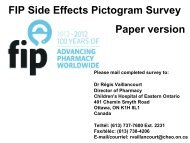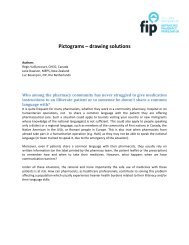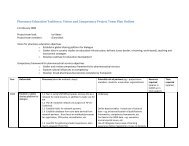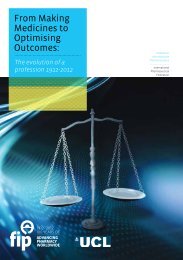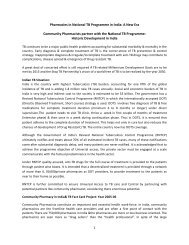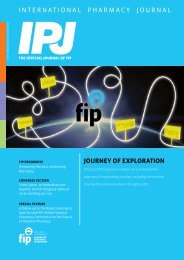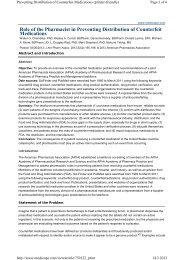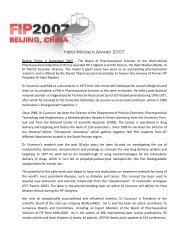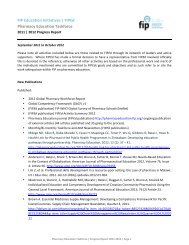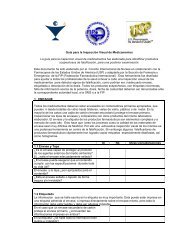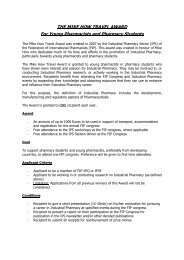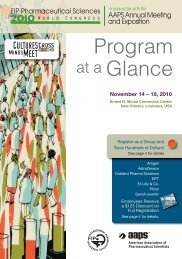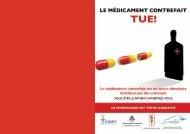here - FIP
here - FIP
here - FIP
Create successful ePaper yourself
Turn your PDF publications into a flip-book with our unique Google optimized e-Paper software.
As identified in the IMS technical report t<strong>here</strong> is a great opportunity for savings of costs that are associated<br />
to non-ad<strong>here</strong>nce, which accounted for more than half of the projected potential savings from improving the<br />
responsible use of medicines, mostly in high-income country contexts.<br />
The discussions during this Roundtable inspired the audience, awakened by this opportunity and the knowledge<br />
that solutions exist to improve ad<strong>here</strong>nce. Systems capabilities can be improved through the use of an<br />
integrated and aligned approach that focuses on the needs of the patient<br />
A patient-centred approach, ensures that t<strong>here</strong> is a richer understanding of patient needs and beliefs from their<br />
point of view, of the psychology of patient medication use, and the best ways to make it easier, cheaper, and<br />
more convenient for the patient to do the right thing in an environment of trust and genuine concern for the<br />
need of the patient.<br />
It is known that the efficacy of medicines decreases because medicines are not used appropriately and often not<br />
taken at all in real life. The continual rise of antibiotic resistance is an example of harm that is directly related to<br />
the lack of responsible use of medicines. If it is simpler, easier, and cheaper to ad<strong>here</strong> to prescribed medication,<br />
improved ad<strong>here</strong>nce is more likely to be achieved that will result in better health for the patient, reduced costs<br />
for healthcare, and increased productivity for our economies.<br />
Poor information and communication, caused in part by a system that does not support healthcare<br />
professionals to spend the necessary time with patients, leads to greater complications and costs to the<br />
healthcare system that could be avoided.<br />
To make change a reality, and make ad<strong>here</strong>nce important to all stakeholders, the incentives, remuneration and<br />
systems capabilities to increase ad<strong>here</strong>nce need to be thought through:<br />
• from building ad<strong>here</strong>nce into the innovation and drug development process;<br />
• to supporting patient education, health literacy and engagement with patients and their carers;<br />
• to ensuring seamless care, through integrating primary and secondary care systems and strengthening<br />
healthcare professional collaboration;<br />
• to strengthening the role of the pharmacist and utilising their full potential in medication review and trust<br />
in the community to support patients;<br />
• to utilising real world experiences and data to inform and continually evaluate and adapt systems to<br />
improve ad<strong>here</strong>nce.<br />
Reimbursement and financial policies can be used to foster integrated care, pharmaceutical care and the<br />
opportunity to spend the necessary time with patients to educate and reinforce the need for use of medicine<br />
in the right way. However, this will only work if the policies are aligned with proper decision making and t<strong>here</strong><br />
is a clear understanding that these early initiatives to support ad<strong>here</strong>nce reduce long-terms healthcare costs.<br />
17


